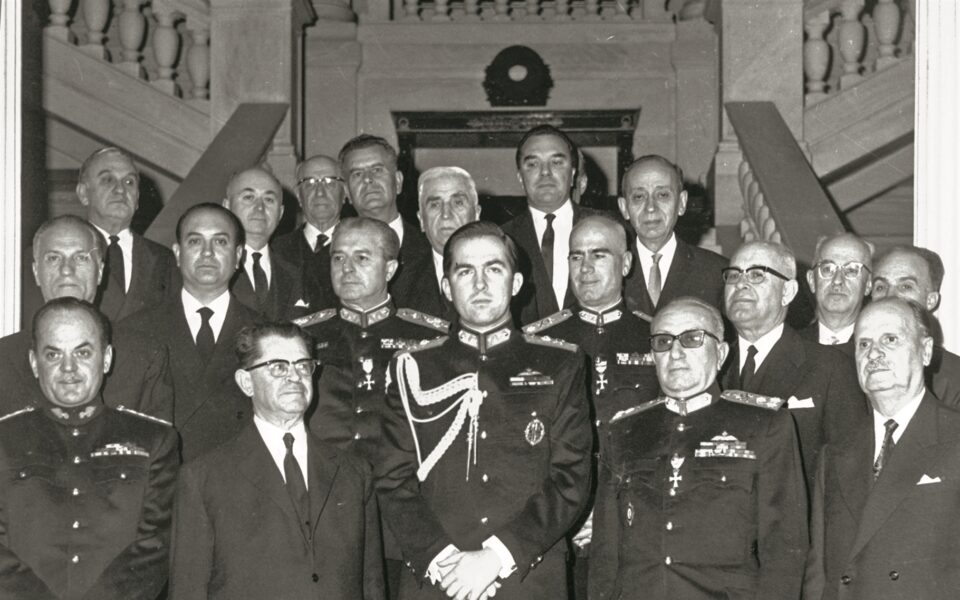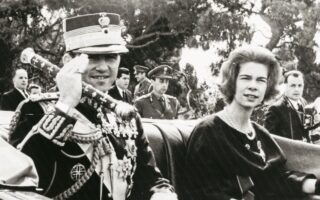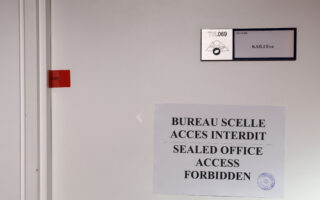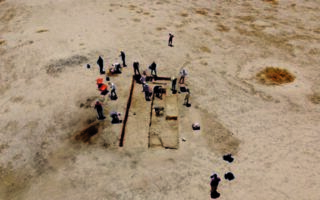Constantine II: From Royal Coup to downfall
Due to a string of serious mistakes and oversights, democracy in Greece was subverted and the king was ousted, never to return

Constantine spent much of his life away from the throne or stripped of it, starting in 1967 as an exile and then in 1973 as a former king, after the monarchy was formally abolished. He lived in Rome and London, not returning to Greece until the early 2000s, and frequently looked back on the 1960s. He often, for example, referred to Vasileios Kardamakis, the military general many believed had spearheaded the campaign to tilt the result of the 1961 parliamentary elections in favor of Konstantinos Karamanlis and his conservative National Radical Union (ERE) party. He also remembered being present for a discussion between Karamanlis and King Paul, where the former insisted on his choice of Kardamakis as head of the Army General Staff. The name was important, because Kardamakis was the military chief responsible for later promoting the officers who orchestrated the 1967 coup to key positions.
In the meantime, one of the most vocal opponents of the monarchy was Andreas Papandreou, though not before his father, Georgios Papandreou, resigned as prime minister in 1965. Constantine first met Andreas Papandreou – who was 21 years his senior – in 1963. Constantine had invited the 45-year-old, American-bred academic with modern ideas to the palace for a discussion about the plan for a new election law being mulled by Paul and obviously “cooked up” by Karamanlis’ Interior Ministry. A variation of the enhanced majority system, it was a departure from the mixed electoral system adopted in the mid-1950s. The pair got into a car and drove to the northern Athens suburb of Kastri to meet with the Old Man, as Georgios Papandreou was known. Constantine said Andreas had agreed with some parts of the new law, but his father was not convinced that it was not designed to favor the National Radical Union. Ingenuous and inexperienced, the 20-year-old Constantine had not realized his position as heir apparent did not endow him with any particular political clout. He failed to see that most politicians regarded him simply as a nice young man who was born heir to the throne.
In January 1965 the king’s relations with Papandreou were still good. In the press, however, there were hints about possible friction. At one event, in fact, Constantine told Papandreou, “I’m afraid some people will make us argue.” The latter answered: “A disagreement between the king and the right is nothing more than a family matter. A disagreement between a king and a democratic faction is a tragedy for the nation.”
The crisis of 1965
The dispute over who would succeed Georgios Papandreou – Konstantinos Mitsotakis or Andreas Papandreou – escalated in the meantime. King Constantine and his entourage were aware of what was being widely discussed, that control of the Center Union was already changing hands and Andreas Papandreou was in the process of creating his own party within the party. Around the middle of May, a newspaper in the central Greek city of Larissa revealed the existence of a secret group of relatively junior army officers under the political guidance of Andreas Papandreou, called ASPIDA (or shield, an acronym for Officers Save Fatherland Ideals Democracy Meritocracy). The source of Constantine’s information was Georgios Grivas, a Cypriot general in the Hellenic Army and leader of several right-wing, anti-communist groups. The existence of ASPIDA was confirmed by Captain Aristidis Bouloukos, the leader of the organization.
Georgios Papandreou learned about the organization. An investigation was conducted at the Ministry of Defense which was completed without assigning any responsibility to Andreas, after the appropriate handling of Defense Minister Petros Garoufalias. King Constantine insisted the case should not be archived and should be sent to justice. On June 9, 1965, charges were brought against those involved in ASPIDA. On the same day, following information collected by a senior official of the Central Intelligence Service (KYP), charges were also brought against the individuals behind an alleged plan to influence the result of the 1961 general elections, which became known as the “elections of violence and fraud.” Georgios Papandreou took advantage of those developments and suggested to his cabinet a change in the leadership of the Army and specifically the departure of Ioannis Gennimatas, who had been accused of participation in the alleged plan to taint the elections.
Constantine reacted with a letter to the prime minister in which he voiced his opposition to any change in the Army. This embarrassed Defense Minister Garoufalias who had informed the king of Papandreou’s intentions, violating the secrecy of the cabinet meeting. The king claimed he had suggested to Papandreou that he choose whoever he wanted as defense minister, except himself, but that Papandreou had rejected his recommendation. “If you trust me as prime minister, you must also trust me as defense minister,” he had replied.
Escalation
In order to resolve the deadlock with Georgios Papandreou, Constantine suggested that jurisdiction for the case of ASPIDA be transferred to the Ministry of Justice so Papandreou could take over at the helm of the Defense Ministry as he wanted. Papandreou declined, prompting Constantine to send him three stern, even offensive letters between July 8 and 14. It was not only a serious faux pas considering who he was addressing and the circumstances, but could be seen as deliberate attempt to cause a rupture in relations. Constantine soon admitted his mistake and sought the advice of Konstantinos Mitsotakis, who was opposed to a rupture and suggested the deadlock could be resolved by calling an emergency meeting of the Center Union’s parliamentary group. What he meant by this suggestion was for the group to come to some decision on the matter of Georgios Papandreou’s succession, as many centrist lawmakers were already opposed to Andreas Papandreou’s growing influence inside the party. The king either failed to understand this important detail or ignored it.
On July 11, 1965, the Old Man traveled to Corfu to meet with Constantine, who was at the Mon Repos Palace for the birth of Princess Alexia the previous day. Mitsotakis had convinced Papandreou to take Parliament Speaker Georgios Athanasiadis-Novas along on the trip. Constantine admitted that on the night of July 14, he called Novas and asked him if he would take over as prime minister. His third letter also reached Georgios Papandreou in Athens on July 14 and was answered by a request for a meeting on the following day. Papandreou tendered his resignation on July 15 and Novas was sworn in shortly after. The speed at which this happened propagated the impression of a plan to topple the government. Constantine, for his part, was convinced Papandreou had been part of a plot to bring the king down. Parliament rejected Constantine’s pick for the premiership and voted, instead, for Stefanos Stefanopoulos.
Despite the friction, Constantine and Georgios Papandreou – who appeared to like the young monarch and to respect his position – kept in touch and also discussed the formation of a caretaker government in late 1966 that would take the country to elections in May 1967.
The colonels
In the meantime, a coup was being plotted by a group of army generals, but was carried out by the colonels, who, thanks to the generals, occupied key positions. Constantine said he had been advised by some government officials to suspend the Constitution and declare martial law.
The three colonels left, but sent the commander of the unit that had surrounded Tatoi to stay with the king. Constantine realized that his power was teetering
Coup masterminds Nikolaos Makarezos and Stylianos Pattakos said Operation Prometheus, to take control of the country on April 21, 1967, had been delivered to them by Grigorios Spandidakis, who had been assigned by his fellow plotting generals to meet with Constantine and ask that he activate the plan before the May elections. That meeting never took place, not because anyone had any qualms, but because the colonels jumped the gun and carried out the coup in the name of the king. Pattakos insisted he had told a fellow officer to inform the king of the plan, but that officer later admitted to never doing so. Despite discussions in the palace about Prometheus and rumors that the king was in touch with the generals, Constantine insisted he had not been making any plans and for decades denied any suggestions that he wanted to make a move, even though this has been documented in declassified American telegrams.
On that fatal night between April 20 and 21, the king was at Tatoi. He was woken up shortly after 2 a.m. to take a call from Major Makis Arnaoutis, a close adviser, who whispered that his house was being shot at. The king called Prime Minister Kanellopoulos, who just managed to inform him that he was being arrested after being physically pulled out of his bed.
The day after
The following morning, on April 21, Constantine met with the orchestrators of the coup, Georgios Papadopoulos, Pattakos and Makarezos, at Tatoi. Papadopoulos argued the “revolution” would save the country and asked the king to declare martial law, which he refused to do. The three colonels left, but sent the commander of the unit that had surrounded Tatoi to stay with the king. Constantine realized his power was teetering. He headed to the palace in Athens, as the new regime cranked up the propaganda machine, saying in radio broadcasts that the “revolution” had taken place at the king’s initiative. Constantine then went to the Defense Ministry, where the three colonels pressured him to form a government headed by Spandidakis. The king demanded to see Prime Minister Kanellopoulos, who was being held prisoner at the ministry. The prime minister, who was notorious for his slow uptake of political developments, demanded Constantine immediately order the colonels’ arrest. The king pointed to the soldiers outside the window and explained he had no control over them. Nevertheless, he summoned the commander of the special forces unit at the ministry and asked that the coup plotters be taken into custody. The commander was arrested instead, as soon as he left the office where he’d met with the king. Constantine went on to name the head of the Supreme Court, Konstantinos Kollias, as the new prime minister. Kollias initially refused the post after being strong-armed by the soldiers sent to inform him of the decision but accepted later at the king’s particular behest.
Not long after this episode, the king asked to be photographed with the coup’s masterminds, believing the public would read his opposition to the regime in the expression on his face. This did not happen. Instead, the photograph was seen as an endorsement of the dictatorship.
The counter-movement
Shortly before the outbreak of the September 1967 Greek-Turkish crisis, Constantine visited the United States, where he met with President Lyndon B. Johnson and told him outright of his plan to bring down the junta. The colonels already knew that was what he wanted, of course. The plan he had devised to bring down the regime on December 13 of that year was a resounding failure. That morning, Constantine met with US Ambassador William Phillips Talbot at Tatoi, and referred to his earlier meeting with Johnson, before asking the envoy – as if nothing could be more natural – to go to the Defense Ministry and inform the chiefs of staff that the American government wanted them to step down.
It was such moves by Constantine that made many people wonder whether he was bluffing or whether his gilded upbringing had left him completely out of touch with reality.
Needless to say, Talbot did not carry out the king’s request. Yet Constantine would not be discouraged and set off for northern Greece, believing he held some sway with the military troops there and could command them to topple the junta. The entire plan failed. The troops he was supposed to meet in Thessaloniki never showed up and the few loyalists remaining in the army had already been arrested. The response from the Navy and the Air Force was only slightly more enthusiastic: A few ships sailed from Crete to the port of Kavala in northern Greece, while a squadron of fighter jets flew over Attica’s military bases. By the end of the day, the king realized his countercoup had failed and fled to Rome with his family, where they stayed until 1974.
Constantine later acknowledged he had made multiple mistakes and was responsible for the countercoup’s failure, but he was also proud of the initiative. The day after he landed in Rome, he received the new archbishop, Ieronymos, who informed the king the junta wanted him to return to Greece. Constantine claimed that he refused the offer and said he would only return when free and fair elections were held.
In 1972, Papadopoulos named himself regent and in 1973 declared Greece a presidential republic, appointing himself as president and Spyros Markezinis as prime minister. The king challenged the dictator by stating he was willing to put his own position to the judgment of the people. This declaration was interpreted by some as an act of resistance against the junta and by others as Constantine shooting himself in the foot because he had failed to grasp that he was alone, without allies, and that the monarchy’s – and his own – popularity and influence had plummeted in the previous decade.
The 1974 referendum
The president of Cyprus, Archbishop Makarios, sent a furious letter to Athens in July 1974 demanding the removal of Greek troops from the island after learning of a plot to topple him. The king, who was frequently in touch with Makarios, had advised him not to send the letter, but went unheeded. Many believe the letter accelerated the Greek junta’s coup against Makarios, which went on to prompt the first Turkish invasion of the island and the fall of the junta within just a few days.
During those turbulent days, Constantine often spoke with Karamanlis, who was in Paris at the time. The former king claimed Karamanlis told him that as soon as he returned to Greece on July 24, he would invite Constantine to also return and name him prime minister. That never happened and the king did not return.
Karamanlis was sworn in instead and went on to ensure to close any institutional gap that could be exploited by Constantine to bring the monarchy back to Greece. In a televised address to the Greek people, Constantine said his exile was being extended due to “special circumstances” and he would not be returning to Greece like other exiles after the fall of the dictatorship.
On December 8, 1974, 69.2% of Greeks voted for the abolition of the monarchy. Even the right was opposed to it. Karamanlis maintained a neutral stance that many interpreted as a rejection of the crown. It is said that Constantine did not give up on the throne immediately. Indeed, he is said to have talked about the possibility of bringing down Karamanlis with a group of friends in the military that he met with in London in 1975. In the summer of 2021, Kathimerini revealed that documents from the Karamanlis Foundation showed the British secret services could confirm that such discussions took place often between 1975 and 1978.
Regardless of whether a plan to this end actually existed, it was never followed through.
This is the third of a four-part series on Greece’s former king Constantine II, who died on Tuesday night, aged 82.





